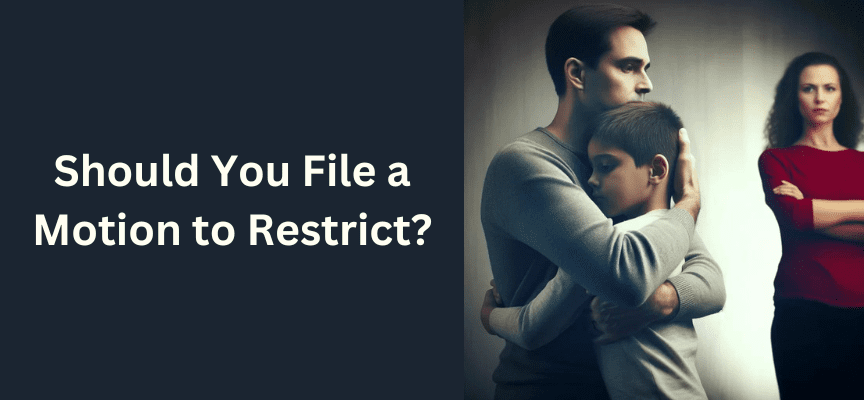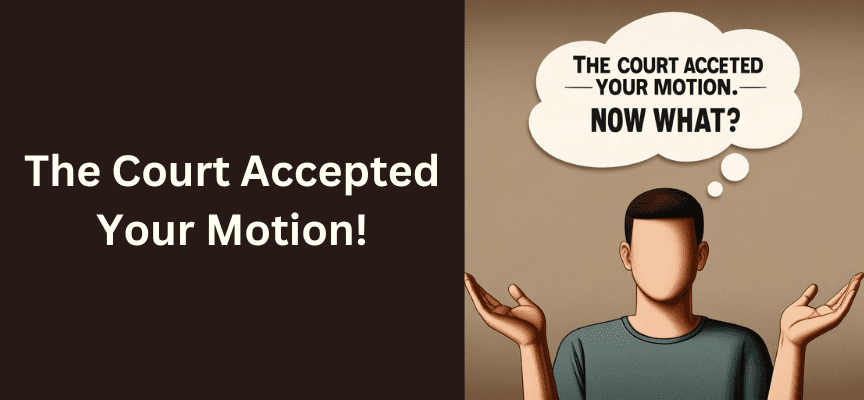You’re considering filing an emergency motion to restrict parenting time.
But should you?
If you file the motion, the Colorado statute states that further parenting time has to be supervised, and the Court must schedule a hearing within 14 days.
The restriction means the other parent will only be allowed visitation under the supervision of an unrelated third party.
However
If you cannot justify the restriction on parenting time to the Court, unsupervised parenting time will resume, and you may be required to pay the other parent’s attorney fees and costs.

Reasons to Restrict Parenting Time
A motion to restrict parenting time must allege that the child is in imminent physical or emotional danger due to parenting time or contact by the parent.
Colorado Revised Statutes Title 14, Article 10, Section 123 (4) A motion to restrict parenting time or parental contact with a parent which alleges that the child is in imminent physical or emotional danger due to the parenting time or contact by the parent shall be heard and ruled upon by the court not later than fourteen days after the day of the filing of the motion. Any parenting time which occurs during such fourteen-day period after the filing of such a motion shall be supervised by an unrelated third party deemed suitable by the court or by a licensed mental health professional, as defined in section 14-10-127 (1)(b). This subsection (4) shall not apply to any motion which is filed pursuant to subsection (3) of this section.
(5) If the court finds that the filing of a motion under subsection (4) of this section was substantially frivolous, substantially groundless, or substantially vexatious, the court shall require the moving party to pay the reasonable and necessary attorney fees and costs of the other party.
But what constitutes imminent danger?
Substance Abuse
Substance abuse is a significant concern that can justify filing for a restriction of parenting time.
If the parent’s substance use impairs their ability to care for their children or poses a risk to the child’s safety, the Court may consider limiting their visitation rights (parenting time).
Child Abuse or Neglect
Allegations of child abuse are taken very seriously by Colorado Courts.
If there is evidence suggesting that your child is being abused or neglected by the other parent, it may warrant a motion to restrict.
These situations often necessitate the involvement of Child Protective Services.
Violent or Criminal Behavior
If a parent is exhibiting violent or criminal behavior towards or around their children, that can be grounds for restricting parenting time.
This includes any behavior that threatens the child’s physical or emotional well-being.
Unsafe Living Environment
An unsafe living environment can significantly affect a child’s well-being and may necessitate the restriction of a parent’s time with the child. Key concerns include:
- Unsecured Firearms: If proper gun storage and safety measures are not in place to prevent the children from accessing the firearm, there may be a serious risk to the child’s safety.
- Unsecured Alcohol and Drugs: The presence of unsecured alcohol or drugs in the home can lead to harmful and even fatal accidental ingestion or exposure by children.
- Association with Dangerous Individuals: If the parent has individuals in the home who have a history of violent behavior or criminal activity, it may pose a threat to the child’s safety.
- Inadequate Living Conditions: A child’s basic needs, such as having a safe, clean living space, must be met. If these conditions are not met, it may be a valid reason to restrict the parent’s time with the child.
When evaluating the safety of a living environment, all of the above factors must be considered to ensure that the child’s well-being is not compromised.
If any of these conditions are present, it may be in the child’s best interest to restrict the parent’s time until the issues are addressed and the environment is deemed safe.
A person can also file a motion to modify and not risk failing to show imminent harm, but then parenting time is not automatically restricted.
Getting The Court to Accept Your Motion
There are several things that your motion needs to show the Court.
Your motion must demonstrate to the Court that the child is in immediate danger in the current parenting arrangement.
But that is not enough
You need to provide sufficient evidence to support your claim of endangerment.
This may include:
- Videos
- Text messages and Emails
- Witness statements
- Recommendations from mental health professionals
- Police Reports
You should also clearly and effectively explain why the restriction is required.
The Court will put a lot of weight behind what it deems to be in the best interests of the child.
This is a very serious motion to file, so it is advised to seek legal advice before submitting the motion to the Court.
The Court Accepted Your Motion. Now What?

When the motion is accepted, the Court will also schedule a hearing that will take place within 14 days.
In re Marriage of Wollert provides that the particularity requirement in C.R.C.P. 7(b)(1) provided the proper standard to review a section 14-10-129(4) motion. Applying Rule 7(b)(1), the Supreme Court concluded that Father’s motion was sufficiently particular to require a hearing within fourteen days.
At this hearing, both parents or their attorneys will present the Court with evidence and arguments, and then the Court will make a final decision.
What will the judge decide?
Worst case scenario:
- Your case is deemed not credible or does not pose an imminent risk of harm
- Parenting time is restored effective immediately
- The other parent is granted make-up parenting time
- You’re required to pay the other parent’s attorney fees and costs
This underscores the importance of retaining an experienced attorney to help with your child custody case.
Termination of Visitation Rights
In extreme cases, the judge may suspend a parent’s visitation rights to protect the child’s safety or well-being.
This may also result in an increased child support obligation for the parent whose rights were suspended.
Supervised Parenting Time Continues
The Court may order that the parent’s visitation continues to be supervised by a nonrelated third party or mental health professional.
Again, this can affect the parent’s child support obligation.
Counseling and Treatment
A parent may be ordered to undergo counseling or enter a treatment program before parenting time is restored.
The Court could order reintegration therapy or some kind of step-up plan to protect the child while giving the parent an opportunity to reinstate their parenting time.
Individual Counseling
The parent may be required to attend individual therapy sessions to address specific issues such as anger management, stress management, or coping mechanisms.
The goal is to help the parent develop healthier ways of interacting with their child and managing their emotions.
Substance Abuse Treatment
If substance abuse is a concern, the parent may be ordered to engage in treatment and random testing.
Family Therapy
In some cases, in order to improve communication and relationships between the parent, children, and other family members, family therapy may be ordered.
This type of therapy can help address underlying family dynamics and work towards healthier interactions between family members.
Parenting classes
The Court may determine that the parent lacks certain parenting skills and order them to take classes.
These classes cover topics such as child development, discipline strategies, and effective communication.
Step-Up Plans

The Court might decide that resuming regular parenting time is in the child’s best interest, but neither the parent nor the child is currently ready for this.
In these cases, the Court may require a step-up plan such as:
Supervised Visitation
We’ve already covered supervised parenting time. But at this point in the process, there may be a set time frame for resuming unsupervised time.
Or
The Court will hold a hearing to hear the recommendations of a therapist or a supervising third party as to the status and will determine whether or not unsupervised time can resume.
Gradual Increase in Parenting Time
As the parent demonstrates improvement and compliance with court orders, their parenting time may gradually increase.
This can include longer visitation periods, overnight stays, or unsupervised visits.
Reintegration Therapy
This type of therapy is designed to help parents and children rebuild their relationships in a safe and structured environment.
It often involves a therapist guiding interactions between the parent and child to foster trust and communication.
This type of therapy can be useful for identifying and correcting alienating behavior by a parent.
Regular Review Hearings
The Court may schedule regular review hearings to monitor the parent’s progress and compliance with the step-up plan.
Based on the parent’s progress, a modification of parenting time may be made.
This is not an exhaustive list, and the specifics of the step-up plan will depend on your case’s unique aspects and the judicial officer overseeing it.
Moving Forward with the Motion
If you believe you have grounds to file and would like to proceed, it is highly recommended that you consult with an attorney who has experience with emergency motions to restrict parenting time.
Emergency restrictions are a serious step that requires careful consideration and a strong foundation of evidence. An experienced lawyer will be able to tell you if you have a strong enough case to file.
Having an attorney draft the motion and argue your case before the Court on your behalf will greatly increase your odds of getting an order in your favor.
Your children’s safety and well-being are paramount. Contact us today, and let our child custody lawyers help protect them.



